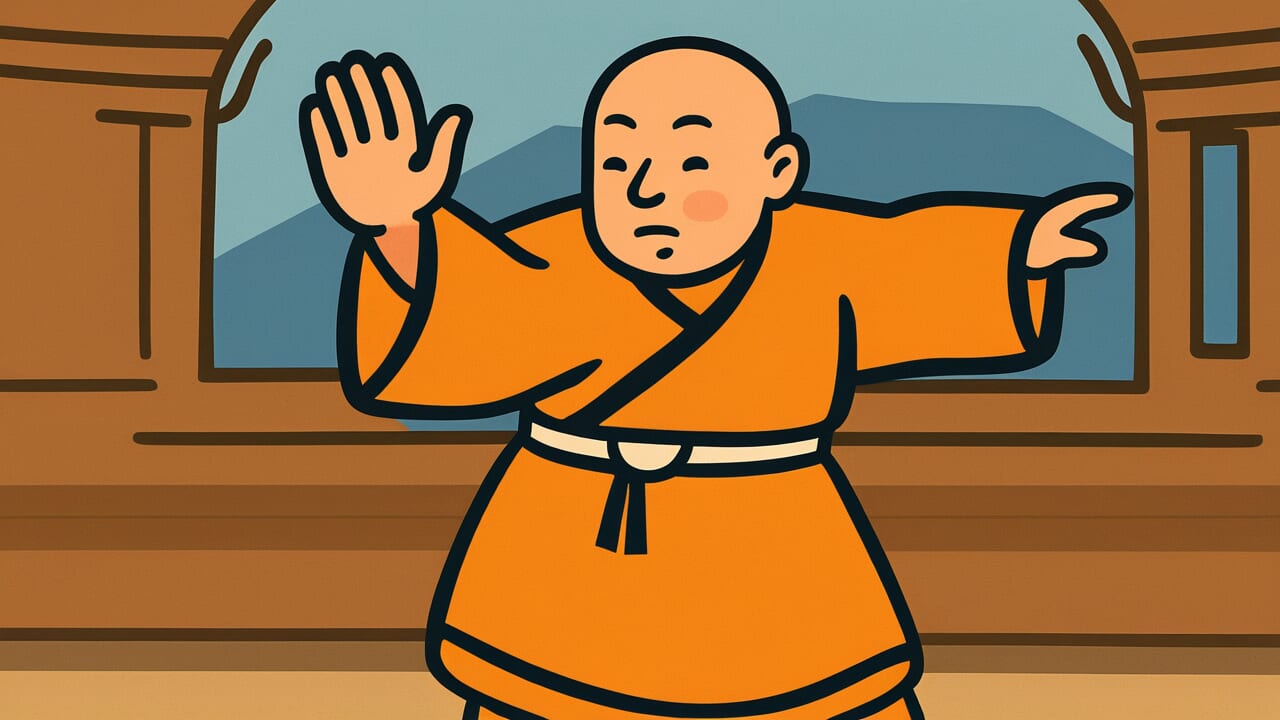How to Read “A monk unsuited for push-ups”
Niawanu sō no udetate
Meaning of “A monk unsuited for push-ups”
“A monk unsuited for push-ups” describes someone doing something that doesn’t fit their position, role, or character. It uses the image of a monk showing off physical strength, which is completely out of place for someone who should focus on spiritual training.
This proverb is used when someone acts outside their true nature. For example, when a usually quiet and intellectual person suddenly starts bragging about their physical strength.
It also applies when someone tries to stand out in an area completely different from their expertise.
The key point is not that the action itself is bad. The problem is that it doesn’t “suit” the person’s position or character.
There’s nothing wrong with a monk doing push-ups. But showing off about it doesn’t match what a monk should be.
Today we value individual personality and diversity. But people still have professional roles and personal identities that define them.
This proverb teaches us, with humor, the importance of not losing sight of our true nature and role.
Origin and Etymology
The exact first appearance of this proverb in literature is unclear. However, the structure of the phrase reveals an interesting background.
A “monk” is someone who has entered Buddhist training. Buddhism has always emphasized mental discipline. The goal is to leave behind worldly desires and seek enlightenment.
For this reason, monks were considered the furthest thing from people who would show off physical force or strength.
“Push-ups” refers to actions that display arm strength. Today we think of the exercise called push-ups. But here it likely means any behavior that shows off physical power.
Until the Edo period, Japanese society valued role-appropriate abilities. Warriors valued martial strength. Merchants valued business skill. Craftsmen valued technical expertise.
Monks were also expected to pursue learning and training to elevate their spirituality. For such a person to boast about arm strength would look ridiculous and show they had forgotten their true purpose.
This proverb reflects Japanese social values. It expresses the idea that each person has behaviors appropriate to their position and role.
Usage Examples
- When that scholarly guy suddenly started bragging about his muscles, it was truly a monk unsuited for push-ups
- Our always-humble senior showing off his connections feels like a monk unsuited for push-ups – it just seems wrong
Universal Wisdom
“A monk unsuited for push-ups” has been passed down through generations. This is because it reflects universal human desires and conflicts.
Everyone wants recognition in their area of expertise. But we also want to be valued in different areas. We want to show our multifaceted appeal.
Between these two desires, people sometimes lose sight of who they really are.
What’s particularly interesting is how this proverb emphasizes the sense of “unsuitability.” Human society has unspoken standards of what seems “right” for each person.
This isn’t meant to restrict people. Rather, it becomes the source of their charm and trustworthiness.
Scholars gain trust by being scholarly. Craftsmen gain trust by being craftsman-like.
Yet people sometimes grow tired of their established identity. They want to show a different side. This might be a desire for growth or a need for recognition.
This proverb understands these fluctuations in the human heart.
Our ancestors understood a truth. When people try to move away from their true nature, they often end up looking ridiculous instead.
This insight comes from deep human observation. It is both gentle and sharp.
When AI Hears This
Imagine a monk doing push-ups. Most people feel something is off. This is a classic example of cognitive dissonance.
Cognitive dissonance occurs when two contradictory perceptions exist simultaneously. The brain experiences discomfort.
What’s fascinating is the speed of this discomfort. The human brain judges something as “unsuitable” in about 0.2 seconds. The emotional rejection happens before logical thinking begins.
Here’s what matters. The combination of monk and push-ups isn’t actually contradictory. In Zen temples, physical labor called samu is part of training.
At Shaolin Temple, martial arts are traditional. Yet we still feel discomfort. This is because our brains link the “monk category” only with spirituality and quietness.
We exclude physicality from that category.
Social psychologist Festinger demonstrated this phenomenon through experiments. When people encounter information that doesn’t fit their categories, they tend to distort or ignore it.
The judgment of “unsuitable” isn’t about the subject itself. It reveals the rigidity of the observer’s mental categories.
In daily life, we simplify reality through these cognitive frameworks. At the same time, we overlook diversity.
Lessons for Today
This proverb teaches modern people the value of cherishing who you really are.
In our SNS-filled world, we can present many different faces. But as we try this and that, don’t we sometimes lose sight of our real strengths?
This proverb teaches the importance of not losing your core self.
Of course, challenging yourself with new things is wonderful. But the key is not to “show off” about it. Instead, quietly work on it for your own growth.
It’s natural for a monk to exercise for health. But making it something to brag about misses the point entirely.
You have a charm that only you possess. It might be expertise you’ve built over years. It might be your personality or way of thinking.
Treasure that core part of yourself while quietly continuing to grow. This way of living creates trust and respect from those around you.
Don’t lose sight of who you are, but don’t forget to grow either. This balance is the warm yet practical message this proverb offers modern people.



Comments